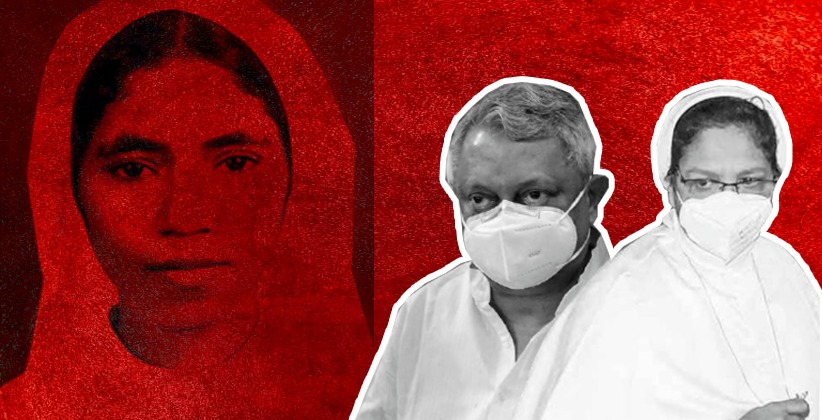A special CBI Court at Thiruvananthapuram on Wednesday ( December 24, 2020) sentenced to life imprisonment Father Thomas M Kottoor and Sister Sephy, a priest and a nun of the Catholic church respectively, for the murder of Sister Abhaya 28 years ago. Kottoor was also imposed an additional sentence of life and a fine of Rupees one lakh under Section 449 IPC, 1860.
It was argued that the murder was gruesome as Kottoor and Sephy were duty bound to protect Abhaya, being her teacher and hostel warden respectively. It was submitted that Kottoor, aged 71, was suffering from cancer and Sephy has aged parents to take care of.
Special CBI Judge K Sanilkumar had found Kottoor and Sephy guilty of murder yesterday accepting the case of the Central Bureau of Investigation that Sister Abhaya was murdered by the convicts after she happened to witness their intimate exchanges inside the convent. While Kottoor has been found guilty for offences under Sections 302, 201 and 449 of the Indian Penal Code, Sephy was held guilty for offences under Sections 302 and 201 IPC. Father Kottoor, the first accused in the case, was a lecturer of Psychology at BCM College, Kottayam, where Sister Abhaya was a student.
Testimony of former thief turns vital:
What proved vital in the case was the testimony of Adakka Raju, a thief who was in the convent premises on the fateful night of March 27, 1992 with the intention of stealing the copper wires from the lightning rod installed at the terrace. Raju told the court that while he was sitting atop a tree to scale down the convent wall, he saw two men climbing down the staircase at the rear side of the building. He identified one of them as accused Kottoor. Raju's testimony turned out to be vital in linking Kottoor to the crime.
Raju also told the court that the crime branch had arrested him soon after the crime and had tortured him forcing him to own up the crime. Though Das said that he had seen Poothrikkayil scaling down the wall of the convent at night on three occasions, his testimony did not specify if he had seen the accused on the date of the crime. Therefore, the CBI Court held in 2018 that there was no evidence to hold that Poothrikkayil was present inside the convent on the date of the crime and discharged him.
Other witnesses
It was stated by this witness that after the death of Abhaya,Kottoor and Poothrikkayil started keeping aloof from their colleagues. It was noticed that Kottoor maintained a grim face and was not at all pleasant. Another crucial evidence was the extra-judicial confession stated to have been made by Father Kottoor to a man named Kalarcode Venugopalan Nair. He told the court that he came in contact with Father Kottoor on account of his interest in the topic of narco-analysis.
In the course of the discussion, Kottoor is stated to have revealed that he had committed a wrong and he had all the weaknesses of an ordinary human being. Venugopalan claimed that Kottoor confessed that he had illicit relationship with Sister Sephy. The prosecution also brought on record expert witnesses who informed the court that Sister Sephy had undergone hymonoplasty surgery to show that she was a virgin.
Case with several twists and turns
The local police and the crime branch of the Kerala Police initially closed the case as a suicide. Soon after that, by November 19, 2008, the CBI arrested Father Thomas Kottoor, Sister Sephy and Father Jose Poothrikkayil. In July 2009, the CBI filed a chargesheet arraying Father Thomas Kottoor, Sister Sephy and Father Jose Poothrukkayil as accused for offences of murder and destruction of evidence. As per the report, Sister Abhaya had accidentally intruded upon Sr.Sephy and the other two accused priests in a compromising position. It was further alleged that Sr Sephy panicked and, on the spur of the moment, Sephy hit Abhaya with an axe meant for chopping firewood. After that, the accuseddumped Abhaya's body into the well. A single bench of Justice V G Arun observed that it was disheartening to note that criminal proceedings pertaining to a crime of 1992 is yet to attain finality, whether it be by reason of providence or design.






